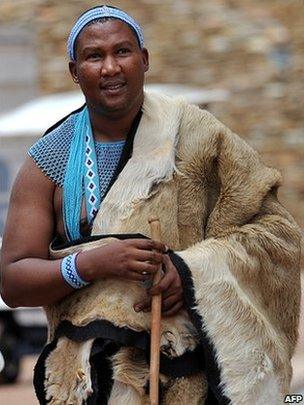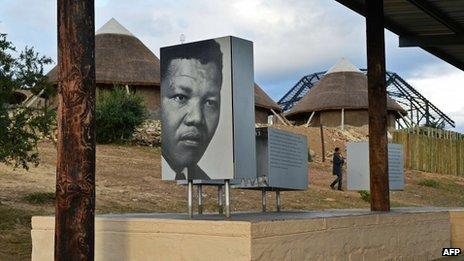Profile: Mandla Zwelivelile Mandela
- Published
Mandla Mandela "It seems like anyone and everyone can come and say 'I am a Mandela'"
Mandla Zwelivelile Mandela, 39, is a powerful figure in South Africa, as he trades on the name of his grandfather, the legendary Nelson Mandela, to build a political and business career for himself.
He first shot into the public limelight in 2007 when he was appointed chief of the Traditional Council in Mvezo, with the approval of the anti-apartheid icon. He is also an ANC MP.
But now Mandla is fighting a rearguard battle to hold on to the chieftaincy, as rival family members try to oust him while Mr Mandela, 94, is critically ill in hospital.
Mandla, Mr Mandela's eldest male heir, sees the feud as part of a battle for control of the ex-South African president's legacy.
"In the past few days I have been the target of attacks from all sorts of individuals wanting a few minutes of fame and media attention at my expense," he said.
The dispute has centred on the burial place of Mr Mandela - should it be in Mvezo, his birthplace, or Qunu, where he lived during most of his retirement?
His family rivals - including his aunt Makaziwe - believe Mandla has been manoeuvring for the burial to take place in Mvezo, so that he can benefit financially from the tourists who will visit the heritage site.
As the first step towards achieving this goal, he moved the graves of three of Mr Mandela's children from Qunu to Mvezo in 2011, they say.
As Mr Mandela lay in hospital, Makaziwe - along with Mr Mandela's wife Graca Machel and other relatives - successfully launched court action to have the children reburied in Qunu, seemingly thwarting the possibility of Mr Mandela being buried in Mvezo.
'Serious and very respectful'
Defeated in court, Mandla is still facing a battle on another front - a move by his brother, Ndaba, to oust him as chief of Mvezo. Ndaba says he does not qualify for the post because he was born out of wedlock.

Mandla Mandela is chief of the area where his grandfather was born
Confident that he will stave off the challenge, Mandla says he accepted the chieftaincy at Nelson Mandela's request.
"He asked me to take it on. He reminded me of my first responsibility, service," Mandla said.
In a BBC interview, Mandla said that when he finished school his ambition was to be a DJ, but when he told this to Mr Mandela, the former president replied: "What's a DJ?"
"I said: 'A Disk Jockey'. He said: 'Nonsense, no Mandela will ever become such, you need to go out and find a career.' So my grandfather has really been the driver behind the person that I needed to be."
In an interview with South Africa's News 24 media channel he suggested that Mr Mandela had chosen him as his heir.
"In 2002, after I had been out of school for a good seven or eight years, he [Mr Mandela] insisted that I should go back to study.
"He really wanted to ensure that if there was a next one in mind to take over and look after the Mandela legacy he needed that individual to have a strong foundation," said Mandla, who later graduated with a politics degree from South Africa's Rhodes University.
Peter Vale, a lecturer at the university, says Mandla was "not in the top drawer academically, but he was serious and very respectful".
Mandla began to play a high-profile political role during the bitterly fought election campaign in 2009 when he threw his weight behind the African National Congress, external (ANC) and its leader Jacob Zuma in their campaign to stave off a challenge from a breakaway party, the Congress of the People, external (Cope).
Extremely wealthy
Amidst intense speculation that the Nelson Mandela Foundation,, external which is officially in charge of the former president's affairs, wanted him to stay out of the divisive campaign, Mr Mandela surprised observers by sharing public platforms with Mr Zuma and Mandla, a possible sign of the grandson's influence over the nonagenarian.
"He [Nelson Mandela] gave his life to the party and he decides for himself. And who is Jakes Gerwel [the chairman of the board of trustees of the Nelson Mandela Foundation] to tell me where to take my grandfather?" he told the Mail & Guardian, external newspaper.
![Former South African President Nelson Mandela (centre) is helped as he walks up the stairs by then-current ANC president and presidential candidate Jacob Zuma (left), his former wife Winnie (right) and his grandson Mandla (behind) at the start of an ANC rally in Johannesburg, South Africa [19 April 2009]](https://ichef.bbci.co.uk/ace/standard/464/mcs/media/images/68533000/jpg/_68533992_48362876.jpg)
Nelson Mandela joined the 2009 election campaign despite his old age
The ANC rewarded Mandla by nominating him to parliament but, says Mr Vale, he "will struggle to go far politically. The big figure of the man will always be there.
"This is not like the Gandhi-Nehru dynasty of India. There was sort of a tradition there that the children will follow. I don't think that will happen [in South Africa]. The ANC is too contested," Mr Vale adds.
Mandla, however, seems determined to portray himself as Mr Mandela's flag-bearer.
"In my veins runs the blood of the Mandelas which has been around for centuries," he once boasted.
In another sign that he relished his new status, he insisted, during a legal battle to evict a tenant from a Mandela home in Soweto, on being called Chief Zwelivelile, a Xhosa name which means "the nation has appeared", and given to him after a circumcision ceremony in 1993.
Says Mr Vale: "This is a young man with an extraordinary amount of gravitas, and a lot of confidence.
"But it will be difficult for him to carry the burden [of being a Mandela]. It always is with these things."

Mandla Mandela is creating a heritage centre dedicated to his grandfather
Already his private life, and especially his divorce from his first wife, Tando, have come under media scrutiny.
In court papers, she said he earned 700,000 rand ($92,000; £62,000) a year as an MP, 800,000 rand ($105,000; £71,000) a year from a freight company, and that he had more than 5m rand($658,000; £444,000) in bank accounts.
South Africa's Sunday Times, external newspaper also fuelled speculation that he was extremely wealthy, reporting that he had declared, in the parliamentary register, shareholdings and interests in eight companies.
"He seems to be caught up with the glitz and glamour of rapacious capitalism. It is one of the problems with young people in South Africa, and he suffers from it too," Mr Vale says.
"The goals of the liberation struggle have become completely distorted."